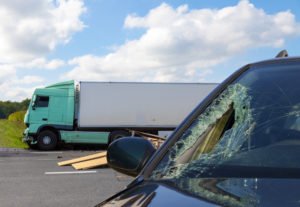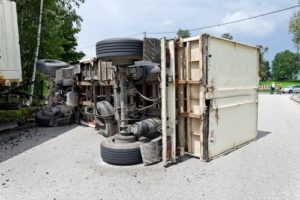
When loaded to capacity, big trucks weigh as much as 30 automobiles, according to the Insurance Institute for Highway Safety (IIHS). So when trucks collide with cars on a highway, these accidents often lead to serious injuries in addition to property damage. These accidents are not as rare as we would hope, either: According to the Centers for Disease Control and Prevention (CDC), one in three truck drivers reports to have been in a serious accident during their career. In 2018, 4,136 people died in accidents involving large trucks; only 16% of them were truck drivers. In 2017—the last year for which the Missouri State Highway Patrol (MSHP) provides data—122 people were killed on the state’s roads in accidents involving commercial vehicles, a category that includes large trucks. More than 4,000 were injured.
Many of these accidents occur because large, heavy trucks have a more difficult time slowing down. When fully loaded, they can take up to 40% longer than cars to brake, according to the IIHS. But they also happen because drivers do not always follow the rules designed to keep them from staying on the road for long stretches at a time, the IIHS reports.
If you have been injured in a truck accident, a St. Louis truck accident lawyer can evaluate your case and review your legal options for free. At Ben Crump Law, PLLC our attorneys work on a contingency basis, which means you pay nothing unless we recover compensation on your behalf.
To schedule your free consultation, call our offices today at (844) 430-1030.
Rules of the Road
To legally drive a large truck, truckers must acquire a commercial driver’s license (CDL), as driving trucks “requires a higher level of knowledge, experience, skills, and physical abilities than that required to drive a non-commercial vehicle,” according to the Federal Motor Carrier Safety Administration (FMCSA). In Missouri, new truckers must complete a written exam and hold a commercial learner’s permit (CLP) for at least 14 days before taking the test to acquire a CDL.
CDLs may be suspended or disqualified for a variety of offenses, according to the Department of Revenue (DOR). Accumulating points from speeding tickets or other offenses—CDL holders are not permitted to take driver improvement programs in lieu of points—could lead to an up-to-one-year suspension. Three “serious” traffic convictions in three years—for example, speeding at 15 mph over the limit, following too closely, being cited in a fatal crash—leads to a 120-day disqualification. Driving a commercial vehicle with a blood alcohol level of 0.04%—half the legal limit for car drivers—renders an automatic one-year disqualification; doing it a second time means a permanent CDL revocation.
In 2020, the FMCSA revised 49 CFR 385, a federal regulation that limits how long truckers are permitted to drive, part of an ongoing effort to keep overly tired long-haul truckers from causing accidents. Under the new rule, truck drivers carrying goods may drive 11 hours per day, but only after taking 10 consecutive hours off. They cannot drive after more than 14 consecutive hours on-duty, even if they were not driving while they were working. They cannot drive for more than eight hours without taking a 30-minute break, and they are not permitted to work for more than 60 hours in seven days or 70 hours in eight days.
For a free legal consultation with a truck accidents lawyer serving St. Louis, call (844) 430-1030
Accident Liability
Missouri uses an “at fault” system for accidents, meaning the motorist responsible for the accident is responsible for the other party’s damages. Even if the truck caused the crash, other parties might share some blame: Perhaps the trucker’s cargo was improperly loaded. Perhaps the truck manufacturer placed a defective part on the truck that contributed to the accident. Perhaps the trucking company coerced the driver into exceeding the federal time limits.
A St. Louis truck accident lawyer with Ben Crump Law, PLLC will thoroughly investigate your case and leave no stone unturned in our pursuit of justice.
Insurance Requirements
According to the Missouri Department of Transportation (MODOT), Missouri has set the following liability coverage requirements for intrastate trucks:
- $300,000 for those carrying household goods.
- $750,000 for those carrying general freight.
- $1 million for those carrying oil.
- $5 million for those carrying hazardous material.
Drivers who leave the state must adhere to minimum coverage standards set by the FMCSA.
- $750,000 for those carrying general freight.
- $1 million for those carrying oil, hazardous waste, and other hazardous substances.
Negligence
According to an FMSCA report, the costs of fatal and catastrophic injury crashes far exceed liability coverage minimums, which means a driver may not have enough insurance to cover all of your damages following a serious accident. If that happens, you may wish to file a lawsuit against the driver. You may also wish to sue if the driver’s insurance company is offering an insufficient settlement or, as mentioned earlier, you have a cause of action against other negligent parties.
Missouri does not limit the amount of economic or noneconomic compensatory damages a victim may recover. It does, however, use a comparative negligence standard, the DOR explains. This standard “allows your damages to be reduced by the percentage you are at fault in a loss.” In other words, if you are determined to be 20% at fault for the accident, your compensation can be reduced by 20%.
You have five years from the date of the accident to file a lawsuit, per § 516.120.
St. Louis Truck Accident Lawyer Near Me (844) 430-1030
How We Can Help
A truck accident can have long-lasting effects on you and your family. It can mean months or years or even decades of medical bills and lost wages. In the worst case, it can even lead to children growing up without a mother or father.
When this happens because of someone else’s negligence, you deserve justice. A St. Louis truck accident lawyer at Ben Crump Law, PLLC will fight for those who cannot fight for themselves.
Call our offices today at (844) 430-1030. Let us get to work for you.
Call or text (844) 430-1030 or complete a Free Case Evaluation form








